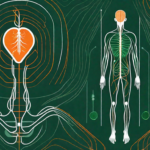If you’ve just heard of the vagus nerve and you’re wondering what it is and why people are talking so much about it, you’ve come to the right place. This article will give you an overview of what the vagus nerve is and why it is considered so important to health and well being.
Recent developments in the medical sciences have been leading us to a more holistic understanding of our body and the enormous amount of interconnectedness that exists within it. To genuinely understand this and the place of the vagus nerve in this new holistic scientific view, we need to think a little about what nerves are and the important roles they play in the body.
What is the Vagus Nerve
Your body is a bundle of bones, muscle and blood, tissues and organs. They are all controlled by the nervous system. Your brain is the center of it all, which is why it’s called the “central nervous system”.
Your brain is made of specialised cells called “neurons”, which are the cells in your body that do the sensing and thinking. But neurons aren’t only found in your brain. Actually these brain cells are also what makes up your nervous system – which is essentially long chains of brain cells extending throughout your body. The network of brain cells are crucial for sensing and controlling your body. Signals pass up and down your nervous system back and forth from the brain, which thereby senses your bodily state and controls all its functions — even the ones you never think about, like your heart beating, your lungs breathing or your stomach digesting.
We usually think of nerves entering and exiting the brain along the spinal cord, but a different set of nerves extend directly out of the cranium — these later are called “cranial nerves”. The body has 12 such cranial nerves which are medically labeled using roman numerals. The vagus nerve is cranial nerve X. It is the longest nerve in your body and takes its name from the old Latin term for “wandering”, because medics observed that it wanders through the body visiting all the primary organs such as the lungs, heart and digestive system.
Some of your nerves are purely ‘sensory’, meaning they send signals back to your brain about things like touch, smell, taste or sounds. Other nerves are ‘motor’ nerves, meaning they help the brain control bodily movements such as when you lift your arm or blink. A few nerves are both sensory and motor — the vagus nerve is just such a nerve. It relays information back to the brain about the state of your vital organs and also carries signals from the brain which control those organs.
Functions of Vagus Nerve

Much of what the vagus nerve does are things that we think of as ‘unconscious’. As the image shows it wanders through the body visiting many of the major organs. It also branches off into the ear and then passes down the neck (with branches reaching out to organs in the throat) before passing into the main torso region of the body.
Above the neck, it is important for controlling saliva ducts in your mouth. Around the neck it plays a crucial role in the functioning of organs that control swallowing, coughing and sneezing.
In your torso it controls heart rate and other cardiovascular functions. It controls the dilation of your major arteries which regulates blood pressure to maintain consistent blood flow throughout the body; and it helps control your breathing.
Finally it plays a major role in the digestive system: everything from the amount of stomach acid released into your stomach to when your stomach empties itself into your lower bowels and how food moves through your bowels as nutrients are extracted.
It also sends information back to the brain about the state and function of all these organs; in fact, 90% of the signals carried by the vagus nerve are actually heading back to the brain. This is what makes it so important to our mental as well as physical wellbeing.
Why is the Vagus Nerve So Important for Health and Wellbeing
We are very accustomed to thinking of our health in explicit ways: how far can we run, how long can we exercise, how good is our resting heart rate or how low is our weight or BMI (Body Mass Index); we might additionally think of skin tone or other aspects of our appearance as markers health. And more recently we might even think of how well we sleep or how balanced our diet is.
But we think less about our mental health and the healthy balance of the nervous system in general. Remember, as we said early, the brain and the nervous system are just different parts of the same thing. The nervous system is just the brain’s extension throughout the body. How well our nervous system functions therefore has a direct effect on our mood and mental health.
Modern medical science is beginning to throw light on the interconnectedness of the brain and body. For example, what you eat affects the health of your gut, which in turn affects the health of your mind. This is nowadays often referred to as the Brain-Gut connection. The vagus nerve is the main nerve that drives this interconnectedness.
The health of our gut is also crucial to the health of our immune system. Signals back and forth from the brain, passing along the vagus nerve, carefully regulate our immune response. If this communication is impaired by a poorly functioning vagus nerve, the immune system can over react to infection, leading to uncontrolled inflammation which can in some cases become life threatening. This has been highlighted recently during the Covid19 pandemic in which over-inflammation (referred to as a cytokine storm) has led to many more life threatening levels of illness.
Even in less extreme situations, the health of your vagus nerve can have effects on your mood, your sleep or your ability to rest, relax and recuperate at the end of a hard day of work. It can lead to anger management issues, depression and low energy levels. In turn this can affect cognition, learning and memory.
Many of these issues we tend to attribute to over work, not enough sleep or simply the aging process. However, although some of the decline in functioning of the vagus nerve is undoubtedly attributable to natural aging, in reality there is a great deal we can do to mitigate the effects by training our vagus nerve using a combination of natural exercise and remedies along with well tested, direct stimulation methods.
How Healthy Is Your Vagus Nerve: Vagal Tone
So if a healthy vagus nerve is that important, it begs the question: how do you know if you have a healthy vagus nerve? And if you don’t, how do you fix it?
Well, the measure for vagal health is often referred to as Vagal Tone. There are a couple of ways that you can measure it at home. The easiest way is to use our specially designed Vagal Tone Calculator questionnaire. This requires no special equipment and will give a sense of how good vagal tone is.
If you have a heart rate monitor, it’s possible ro measure you Heart Rate Variability (HRV) — you can read more about that in one of our other blog posts here.
If your vagal tone is a little on the low side, there are many things you can do to improve it. Recent scientific studies have recommended the use of a stimulator such as our which is a good way to get started. But we always recommend it is used in conjunction with a range of natural exercises and routines. You can read more about that in our next blog post — sign up to our mailing list at the bottom of this page to be notified as soon as we publish it.


